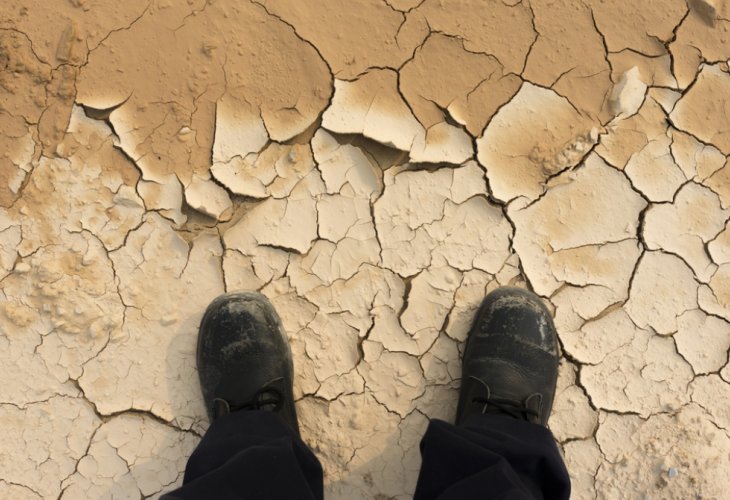Faith
Created from Dust: The Deeper Meaning of Humanity’s Earthly Origins
Why God formed man from the lowest element — and how this shapes our humility, purpose, and spiritual journey
 (Photo: shutterstock)
(Photo: shutterstock)Tomer asks: "Hello, I have two questions:
In the Torah it says that man was created ‘from the dust of the earth,’ and later God says to him: ‘For you are dust, and to dust you shall return.’ How should we understand these verses in light of science, if our bodies don’t actually turn into dust after death? I’ve heard that fossils of skeletons have been found preserved for thousands of years.
The Torah says that man was created ‘in the image of God.’ So why did God choose to make him specifically from earth’s dust? Why not from a more valuable material, like gold or diamonds, or even something more durable like wood or stone?"
* * *
Hello Tomer, and thank you for your questions.
The verse you mentioned does not contradict science. The human body is made of flesh and blood, which decompose after death and eventually break down into tiny particles of dust and ash, until nothing identifiable remains in the earth where it was buried. Bones are made of a hard but lightweight tissue. Between the cells of this tissue are layers of calcium and protein fibers called collagen, which give bones their hardness. Bones are made of living cells, not “stone” as people sometimes imagine. Over time, even bones naturally break down into dust in the soil. (It’s well known that when a body is cremated, it instantly turns into ash. In many Western countries, ashes are placed in small urns for burial.)
Fossils that scientists discover are not skeletons that have remained intact for thousands of years. Fossils form when an animal becomes trapped in wet earth or mud that hardens around it. The body then decays naturally, leaving an empty cavity where minerals slowly seep in, creating a stone-like cast in the exact shape of the original bones. The original bones themselves have long since decayed.
There are rare cases where skeletons have been preserved for thousands of years, but these are exceptions, due to very specific environmental conditions. The overwhelming majority of human and animal bodies from the past thousands of years have left no remains. In nature, microorganisms break down dead bodies, returning them to the soil as dust.
Why God Created Man from Dust
God created man from the dust of the earth as a deliberate parallel to his end. Just as man’s body began from the earth, it will one day return to it. This reminds us that our life in this world is temporary and that we have a purpose to fulfill during our limited time in a physical body.
The Torah says: “For you are dust, and to dust you shall return” (Genesis 3:19). This is intended to humble us and to steer us away from chasing physical pleasures and fleeting beauty that vanish when the body dies. Everything physical returns to the ground beneath our feet. It is a message for all generations to invest in eternal spiritual pursuits, not in passing illusions.
In Jewish thought, dust is considered the lowest of the four physical elements (fire, air, water, and earth) because it is inanimate and motionless. It is also the most humble, lying beneath everything else. This is why in the Amidah (standing) prayer we ask: “May my soul be as dust to all.”
Abraham expressed this humility when he said: “I am but dust and ashes” (Genesis 18:27). The medieval commentator Ibn Ezra explained: “I was dust, and I will return to ash.”
When a person accepts that his body will one day return to the same soil people walk upon, arrogance becomes impossible. No matter how strong, beautiful, wealthy, or honored someone may be, all are equal before this simple truth.
The Spiritual Message
Beyond humility, God wanted to teach us something central about our spiritual work: the tension between body and soul.
The human body, like that of animals, comes from the earth. The Torah says: “Let the earth bring forth living creatures according to their kind” (Genesis 1:24). This implies that our physical nature is like that of the animals, in that we share bodily instincts and material drives.
However, there is one key difference: after God formed the human body from the dust, He breathed into it a spiritual soul: “And the Lord God formed man from the dust of the ground, and breathed into his nostrils the breath of life” (Genesis 2:7).
The Talmudic Sages taught: “Six things were said about mankind: three are like animals, and three are like the ministering angels.
Like animals: they eat and drink, reproduce, and excrete. Like angels: they possess intelligence, walk upright, and speak the holy tongue.” (Avot d’Rabbi Natan 37:2)
The Torah shows that man is a paradox — his body is “dust,” but his soul is “heavenly.” His feet are planted in the earth, but his mind can reach the heavens. This is the essence of our struggle: “Sin crouches at the door… but you can rule over it” (Genesis 4:7). The righteous control their impulses; the wicked are controlled by them.
When we die, the body returns to the ground like an animal’s, but the soul returns to God to give an account: “Who knows if the spirit of man rises upward and the spirit of the animal goes down into the earth?” (Ecclesiastes 3:21).
God made man from dust to remind him of his humility, to teach him about the fleeting nature of physical life, and to set the stage for the ultimate human challenge of elevating a lowly physical body through the guidance of a divine soul.

